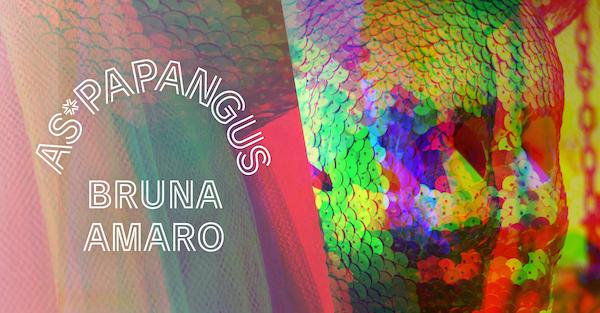AS* PAPANGUS Street Performance in Berlin
Sat, 7 May 2022 15:00-17:00at Oyoun
AS* PAPANGUS Street Performance in Berlin
our carnival, our body, our fight
In October 2019, in the city of Bezerros located in the countryside of Pernambuco, Brazil, I met Papangus. The Papangu mask has been part of the Pernambuco imagination for at least a century and is activated by the people on the streets during the carnival, complemented by a full-body costume. The residents of Bezerros say that the mask was used by men to play the carnival hidden from women*, that they dressed up in Papangu and partied without being recognized. Where, in this popular imagination, are the Papangu women*? AS* PAPANGUS is a carnival for, by and with women* that does not objectify any marginalized body. In AS* PAPANGUS, the Afro-Brazilian artist Bruna Amaro performs a carnival in its most queer-feminist and decolonial form, with more than 50 women* in São Paulo and Berlin. Under the Papangu masks, facial identities fade away and a collective body appears. This body is a battlefield for survival, resistance and rebuilding. AS* PAPANGUS is a coming-together of women* fighters to honor and celebrate their life and survival. In this participatory project, a series of performance workshops lays ground for the following acts. During the two-day workshop in São Paulo, the artist and the participants collectively build up movements and statements for their street performance. Phrases manifesting experiences of survival, transformation and labor, are embroidered on the costumes handmade by Bruna Amaro and the seamstress Eliana Amaro dos Santos. In the street performance on April 10, 40 women* walk down the streets of São Paulo with the Papangu clothes on, with the statements on their chest, braced with handcrafted props, and dancing to the festive music. As they let their bodies speak, the bodies become flags of triumph. In the following multimedial exhibition at Oyoun Berlin from April 30 to May 27, the video documentation of the carnival performance in São Paulo will be projected on the costumes and masks. The costumes from São Paulo are revived by 10 women* in Berlin, who participate in a two-day workshop and in the following street performance in the neighborhood of Oyoun. The procession on the streets of Berlin-Neukölln invites other FLINTA persons to join the walk. I understand the Papangu mask as an object that covers the face and the body, in direct reference to some cultures of the West of the African continent — such as the Geledes of Yoruba people, and the Bobo people in Burkina Faso. I also think of it as a magical and powerful object, as in the Noh and Balinese theaters — the trigger of incarnation. We will activate the Papangu mask, while we celebrate our covered faces and exposed bodies, claiming the right for festive anonymity. In patriarchal societies, men are often given the exclusive right to perform on stage, to wear masks as an performative tool and as an outlet for artistic expression — as in Bezerros tradition where only men used to wear the Papangu masks. Through AS* PAPANGUS, Bruna Amaro questions: who gets to be anonymous, who gets to be free from social norms, who gets to indulge in the moment of
AS* PAPANGUS critically engages with the colonial matrix of carnival, staying alert to oppressive gaze and disallowing exploitation of queer bodies, bodies of women*, of color, with disabilities, and the bodies under structural oppression. Papangu women* do not walk down the streets to be consumed, they walk to celebrate themselves. AS* PAPANGUS opens the first chapter of Oyoun’s curatorial focus Mightier than a Trampled Flower, which centralizes life of women* in wars from a decolonial context and deconstructs the canonical narratives of women* in war. Biography Bruna Amaro is an Afro-Brazilian artist, performer, educator, researcher, and percussionist based in São Paulo, Brazil. Carnival, Art, and Politics are three axes that have been moving my artistic production in recent years. Based on theoretical research and experimentation with the materialities and formats found in one of the largest Brazilian parties, I propose re-readings of images and exposure of themes - such as violence and political directions - in addition to questions about the motivations that make us celebrate.
More information at: brunaamaro.com instagram.com/amarobru facebook.com/amaro.bruna
Contributors (to be extended)
Eliana Amaro dos Santos, Seamstress
Paula Correa Pedroso, Producer
Yve Zolli Nolasco, Producer
Fernanda Andrade, Videographer
Suellen Santana Amaral, Videographer
Cássia Roberta Araújo de Oliveira, Photographer
Maria Clara Silva Loureiro, Photographer
PARALLEL PROGRAM
May 7, 2022
AS* PAPANGUS Street Performance in Berlin
3-5pm CET
Oyoun and in the neighborhood of Oyoun
